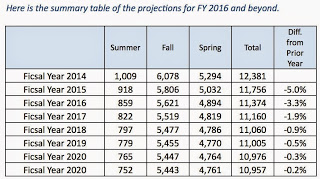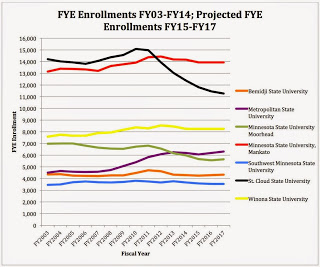Archive for April, 2015
President Potter: Necessary Fact Checks!
by Silence Dogood
On April 20, 2015, President Earl Potter sat for an interview with Jim Maurice on AM 1240 WJON.
According to the article President Potter makes a number of statements that need to be fact checked.
“St. Cloud State University is also hoping a three-year plan to add new programs, and close others, can help aid reverse a three-year trend of declining enrollment.” Earl Potter III WJON interview April 20, 2015
According to the website of the Office of Strategy, Planning and Effectiveness the following enrollment plot is shown.
The plot clearly shows a decline in FY11, FY12, FY13 and FY14. On February 16, 2015, Associate Vice President and Associate Provost Lisa H. Foss sent an email entitled: “FYE enrollment projections information.” A table from the email is reproduced below.
FY 15 is not yet through but the table shows that enrollment will be down 5.0%. So if enrollment was down in FY11, FY12, FY13, FY14 and FY15, isn’t this a five-year enrollment decline? So what “three-year decline” is President Potter referring to when he hopes for a reversal in SCSU’s prospects? In the five-year period since FY10, FYE enrollment at SCSU has declined by 21.8% and according to his data analytics group, enrollment is predicted to decline for another 6 years. If his group is right SCSU is at least 6 years away from possibly turning the corner on enrollment decline.
Declining enrollment not responded to has resulted in deficit spending at SCSU and here is what Potter told WJON:
“Potter says they’ve trimmed the budget by $4 million this year, and they’ll need to make another $10 million in cuts next year.” Earl Potter III WJON interview April 20, 2015
Let’s check the second part of the statement first (that “they’ll need to make another $10 million in cuts next year.”) A portion of the Meeting Notes of the Portfolio Management & Resource Allocation Steering Group meeting of April 8, 2015 is reproduced below.
This document clearly states that the FY16 cuts are going to be $12 million. I guess while President Potter was on his three-week international excursion he wasn’t keeping up with the activities on campus as well as he thought he would. Or perhaps he has new information that the cuts will only be $10 million. If this is indeed the case, he probably would have stated that he originally thought he needed to cut $12 million but found out that he only needed to cut $10 million. Unfortunately, it is more likely that the cut really needs to be $12 million and he either misspoke or is ‘out of the loop’. Let’s hope it’s the former and not the latter.
On Thursday, April 23, 2015, Vice President for Finance and Administration Tammy McGee provided documents at the Budget Advisory Group meeting that list the projected deficit for FY16 as $12,268,000.
Now the first part of the statement also needs to be checked (“Potter says they’ve trimmed the budget by $4 million this year).” According to budget documents released on Thursday, April 23, 2015, by Vice President for Finance and Administration Tammy McGee at the Budget Advisory Group meeting, SCSU has not actually cut $4 million but rather only $2,827,000. As a result, $1,173,000 still needs to be cut to get to the $4 million target and that will still mean SCSU will have spend $5.5 million more than it takes in revenue this year.
Given that there are less than three months left in the fiscal year and that it is not possible to cut personnel contracts, it is going to be very tough to come up with another $1.2 million without causing significant harm. It is also important to understand that if the cuts are one-time cuts, it will simply kick the can down the road and increase the amount that needs to be cut from the FY16 budget. Further VP McGee reported that reserves which should be, by MnSCU policy, $10.5 million will have been drawn to $1.5 million—even if the additional cuts are achieved. As a result, in order to replenish the reserves to 10.5 million the cuts would need to be greater than 21 million
“Declining enrollment has been common at public universities across the state and country since the end of the great recession.” Earl Potter III WJON interview April 20, 2015
I’m not going to challenge the enrollment across the country part of this statement but the following Figure shows MnSCU data for FYE enrollments from FY2003 through FY2014 (the actual final numbers), plus as of last fall each university’s own predictions for enrollment for FY2015, FY2016 and FY2017.
Only two universities in the MnSCU system could be labeled as being “in decline” and they are Minnesota State University—Moorhead and SCSU. From FY10 to the prediction for FY17, Moorhead’s decline of 1,072 FYE represents a decline of 15.9%. For the same time period, SCSU’s decline of 3,871 FYE represents a decline of 25.3%! It is also interesting to note that Moorhead actually predicts an enrollment ‘bottom’ for FY16 followed in FY17 by an increase of 96 FYE. On the other hand, SCSU’s prediction for FY17 continues the enrollment slide from FY16 losing an additional 195 FYE.
“The President of St. Cloud State University says they’ve turned a corner after years of declining enrollment.”
President Potter cites that new student admissions and new entering transfers are up for next fall. Additionally, he cites that “our returning students are up as well.” Unfortunately, his highly praised Data Analytics Workgroup on February 15, 2015 predicted FY16 enrollment would be down 3.3%. As a result, even if the new student admissions and transfer admissions are up, the prediction is that the enrollment will still be down. Decreasing the enrollment decline from 5.0% to 3.3% is a good thing. However, it is important to recognize that the enrollment is still declining. A 3.3% decline is going to lead to a loss in tuition revenue and ultimately the enrollment loss will lead to a lower state appropriation.
So the question is exactly what ‘corner’ has been turned? The Data Analytics Workgroup projections for FY17 was a decline of 1.7%, FY18 was a decline of 0.9% FY 19 was a decline of 0.5%, FY20 was a decline of 0.3% and FY21 of 0.2%. While the rate of decline is projected to decrease, has a corner really been ‘turned’ if the enrollment is projected to decline for the next six years?
“If SCSU can start growing enrollment again, Potter is hoping to be back to a positive budget by 2017.” Earl Potter III WJON interview April 20, 2015
Unfortunately, even if all of the cuts are made and enrollment declines follow the projections, for FY16 SCSU will still have spent all but 1.5 million of its reserve. If SCSU has to rebuild the reserve to 10.5 million (as required by MnSCU), the budget for FY17 will have to be cut by 10.5 million, enrollment will have to grow significantly without increasing expenses in order to generate excess revenue to expenses, or a combination of the two for SCSU to be restored to fiscal health.
If President Potter’s excuses: “part-time students,” “demographics,” “that shock of coming out of the recession,” and the “decline in the number of high-school graduates” have any basis in fact, it is hard to believe that SCSU will be able to “turn the corner.” More likely, we’ll just hear another excuse and more misstatement of fact.
I’ve written two posts on Brian McDaniel’s statements on the transportation bill. (This is the link to my post about McDaniel’s appearance on Almanac. This is the link for my post about McDaniel’s appearance on At Issue.) In those posts, I expressed my bewilderment with McDaniel’s statements pushing for a compromise on the DFL’s gas tax proposal.
This information from Minnesota’s Campaign Finance Disclosure Board dropped the pieces of this transportation puzzle into place:
According to this report, Margaret Donahoe is the “executive director” of the Minnesota Transportation Alliance. That report didn’t reveal this information:
McDaniel didn’t state that he’s a paid lobbyist for the organization pushing the DFL’s gas tax. He didn’t disclose this conflict of interest when he appeared on Almanac. McDaniel didn’t disclose this important information when he appeared on At Issue.
It’s disgusting that McDaniel didn’t disclose this information. It’s one thing to speak in favor of legislation as a private citizen. It’s another to speak in favor of legislation like you’re a private citizen when you’re actually a paid lobbyist.
It’s standard procedure to disclose that you’re a paid lobbyist for an organization that’s pushing a policy that you’re discussing. To do otherwise is dishonest and corrupt. When others have been caught in that situation before, they’ve started their first sentence by saying “In the interest of full disclosure.” Then the viewers understand that the lobbyist has a dog in that particular hunt.
At this point, Republicans should tell Mr. McDaniel that they won’t listen to his pitch anymore because he isn’t transparent in his dealings with legislators. More importantly, Republicans should reject all calls for a gas tax increase because it’s a failed policy. The DFL tried that approach in 2008. It failed miserably. Because it failed miserably in 2008, the DFL is back asking for a bigger gas tax increase this year.
Move MN, the Minnesota Transportation Alliance, the DFL and Gov. Dayton must be desperate if they’re pushing the gas tax without telling us that they’re sending out paid lobbyists to act like regular citizens speaking out on this issue.
Finally, Republicans should stand firmly against the gas tax increase. They’re on the winning side of this issue.
Technorati: Brian McDaniel, Lobbyists, Move MN, Minnesota Transportation Alliance, Margaret Donohoe, Corruption, Transparency, Minnesota Campaign Finance Disclosure Board, Gas Tax Increase, DFL
I’ve said from the outset that Rick Santorum’s campaign for president was mostly the product of his ego, not Santorum’s credentials or credibility. After reading Brendan Bordelon’s article, I’m certain I’m right:
After his upset victory in the 2012 Iowa caucus, driven largely by the state’s powerful evangelical voting bloc, many expected the former Pennsylvania senator to be welcomed back with open arms. But compared to the other eight Republican candidates present at the Des Moines-area conference, Santorum’s speech fell strangely flat. The audience didn’t clap much, and when they did it was usually polite and perfunctory. Lines that felt like they were meant to be showstoppers were at times met with awkward silences.
Sen. Santorum’s time has passed. He’s lost too many times to be taken seriously again. He’s a one-trick pony in a field filled with candidates who represent the total package. This won’t sit well:
He called the Republican Party’s supply-side, free trade message outdated and pushed for a minimum wage hike. “We’re keeping down the wages of American families,” he said. “We need to say we’re on the side of American workers.”
If I wanted to be snarky, I’d argue that Santorum should run as a Democrat. He’d be more competitive than some of the other slugs they’re running.
Observers believe Santorum may be misreading his audience this time around. “It didn’t resonate,” said Dennis Goldford, a professor of politics at Des Moines’ Drake University. “Santorum sort of moved to that blue-collar conservatism, populist kind of approach … That’s not what will sell this particular crowd.”
In 2012, Santorum could point to voting for welfare reform as a legitimate accomplishment. That’s ancient history now. His intensity is intimidating or off-putting to most voters. The only state where he might do well is Iowa. At this point, that isn’t likely. After that, Santorum will get pummeled.
Right now, he’s competing with at least 3 other Republicans for the evangelical vote in Iowa. Put differently, he’s fighting for a sliver of a sliver of the Republican Party’s base. Meanwhile, Scott Walker is drawing support from many parts of the Republican Party. Call me crazy but I don’t think that’s a fair fight.
The Minnesota Wild are advancing to the second round to meet the Chicago Blackhawks thanks to Zach Parise’s grit and talent and Devan Dubnyk’s goaltending. The contrasts told the story. St. Louis was thought to have the edge in toughness and physicality. While that was true, what St. Louis lacked was a goalie, mental toughness and Zach Parise’s veteran leadership.
When Paul Stastny drew a Nino Niederreiter interference penalty 11:14 into the first period, Zach Parise went to work, scoring this shorthanded goal:
There’s no way an NHL goalie should give up a goal like that. Period. That isn’t the type of goaltending the Wild got from Devan Dubnyk.
Dubnyk was the difference maker for the Wild since Wild GM acquired him on January 14. Dubnyk had a tough night in Game 4, eventually getting pulled. Dubnyk’s mental toughness, though, led to a resurgence in Games 5 and 6. In those games, Dubnyk stopped 66 of 68 St. Louis shots on goal. That included T.J. Oshie’s’ goal with 4 seconds left in the second period. During the second intermission, Wild nation worried if that fluke goal would ignite a St. Louis rally in the third. Those fears were eliminated 1:01 into the third period, with Parise again doing the eliminating on this rush:
The Wild’s mental toughness and teamwork pulled them through yesterday’s game and last week’s series. After Dubnyk’s tough night in Game 4, he quickly put the game behind him. The result was back-to-back sterling performances where his save percentage skyrocketed to 97% for those games.
The Wild’s centers were subtle difference makers, too. Captain Mikko Koivu led the way with gritty, smart 2-way play, something St. Louis Coach (at least for a few more hours) Ken Hitchcock wishes he would’ve had. Mikael Granlund faded offensively from time to time only to reappear with a vengeance, like he did on Parise’s second goal. Charlie Coyle’s physicality, especially in the defensive zone, never let St. Louis Captain David Backes get his game going.
Justin Fontaine’s goal ended St. Louis goalie Jake Allen’s night. Brian Engblom’s interview of St. Louis Coach Hitchcock might’ve sealed Hitchcock’s termination:
That’s gotta sting. Less than a minute after Hitchcock told the reporter that he didn’t think about pulling goalie Jake Allen after Parise’s shorthanded goal, Hitchcock pulled Allen after he let in another soft goal, this one from Justin Fontaine.
The story of this series was that a) Minnesota’s stars played like stars, b) Minnesota’s depth wore St. Louis’ physical players down and c) Devan Dubnyk, though this was his first playoff hockey, played with veteran guile.
Chicago has eliminated the Wild the last two seasons, with the Wild getting more competitive each year. This year, Chicago is dealing with goaltending problems. That’s why I’m picking the Wild to eliminate Chicago in 6 games.
Technorati: Minnesota Wild, Zach Parise, Devan Dubnyk, Mikko Koivu, Charlie Coyle, St. Louis Blues, Jake Allen, Ken Hitchcock, David Backes, Stanley Cup Playoffs
The International Association of Machinists and Aerospace Workers called off a union organizing vote in their attempt to unionize Boeing’s South Carolina plant:
The union looking to organize workers at Boeing’s South Carolina plant has put its plans in a holding pattern, claiming workers are so opposed to signing up that they chased labor leaders off their porches at gunpoint.
The union issued this official statement:
“After speaking with Boeing workers who we were previously unable to reach, we’ve determined now is not the right time for an election,” union organizer Mike Evans said in a statement. “An atmosphere of threats, harassment and unprecedented political interference has intimidated workers to the point we don’t believe a free and fair election is possible.”
The union filed an unfair labor practice with the National Labor Relations Board in which it alleged that “two organizers were threatened at gunpoint and others reported hostile and near-violent confrontations,” according to a union press release.
The union’s claims were disputed:
“I can only speak to the union’s claims as a whole,” Doug Alder, a spokesman for Boeing said in a statement to FoxNews.com. “The IAM’s allegations are frivolous and our team is continuing to focus on building the highest-quality airplanes in the world.”
A Charleston police spokesman said there have been no reports of organizers having guns pulled on them in the city. “We haven’t heard of any such reports,” the spokesman. “If it happened, they didn’t call the police.”
A spokesman for the Charleston County Sheriff’s Office also said there had been no reports of gunpoint threats directed at union workers. “I am unaware of this type of incident occurring in the unincorporated area of Charleston County,” he said.
In other words, it’s likely that the International Association of Machinists and Aerospace Workers union knew that they were heading for a demoralizing defeat so they called off the vote, then decided that they’d blame it on corporate thugs threatening physical violence. That BS has been exposed as fraudulent. It’s one thing to have the corporate spokesman deny the allegations.
It’s quite another when the sheriff’s office contradicts the union’s allegations. If I’m left to pick between trusting the union or the sheriff’s office, I’ll trust the sheriff’s office every time.
Senate Majority Leader Bakk’s statements on raising the gas tax are bewildering because they’re inconsistent. Check out what Sen. Bakk told Bill Hanna in mid-January:
Senate Majority Leader Tom Bakk of Cook, who will have a lot to see in any final road funding bill, echoed Tomassoni’s assessment about road funding.
“There’s tremendous support for fixing roads and bridges. But the funding is never popular,” Bakk said. “I don’t know what the whole thing will look like, but we will have the conversation. We’ve got a serious 20-year problem.”
Here’s what the Senate DFL proposed back then:
Senate DFL: $800 million a year through a gas tax increase at the wholesale level of 6.5 percent a gallon, which would come on top of the current 28.5 cents per gallon gas tax and a metro-only 1-cent sales tax increase, which would raise an estimated $251 million in 2016 for Twin Cities transit costs.
There’s no denying that Sen. Bakk supported raising the gas tax to fix Minnesota’s roads and bridges. Fast forward to Don Davis’ article. Here’s what he’s saying now:
Enter Senate Majority Leader Tom Bakk. The St. Paul Pioneer Press reports that he says there really is no need to approve billions of dollars in transportation improvements this year. “Transportation probably doesn’t have to happen. … We can kick the can down the road for the next Legislature to deal with. That’s what’s been happening.”
Sen. Bakk better hope that people don’t notice that he’s indicted the DFL with his statement. Since 2007, Republicans had the majority in the Senate in 2011-12. Republicans control the House this year. They also held the majority in 2011-12.
By comparison, the DFL held supermajorities in the House and Senate in 2007-2010. In 2007, the DFL held an 85-49 seat majority in the House and a 45-22 majority in the Senate. After the 2008 election those margins changed to 87-47 in the House and a 46-21 majority in the Senate. Add into that the fact that Mark Dayton was the DFL governor and that the DFL had complete control of the Legislature in 2013-14. Sen. Bakk speaking of kicking the can down the road is indicting himself. They had the perfect opportunity to fix our roads and bridges, then opted to kick the can down Minnesota’s potholed roads.
Sen. Bakk’s spin is bewildering because he won’t stake out a consistent position. That’s proof, in my opinion, that he’s playing a purely political game because he’s caught in a politically difficult position.
That’s what happens when you try to play politics instead of doing the right thing right from the start.
Technorati: Tom Bakk, Mark Dayton, Gas Tax Increase, Transportation, Potholes, DFL, Election 2006, Election 2008
Last week, I wrote this post about Brian McDaniel’s statements about whether Republicans should give into the DFL’s plans to raise the gas tax. Last week, McDaniel suggested that Republicans should give in on raising the gas tax in exchange for a few shiny trinkets in a larger tax bill. One of the things I highlighted in that point was that raising the gas tax was terrible policy.
In 2008, the DFL raised the gas tax by a nickel a gallon. At the time, they said that would help rebuild Minnesota’s crumbling roads and bridges, “which have been neglected” for years. The DFL promised that raising the gas tax by a nickel a gallon would provide the additional revenue needed to fix Minnesota’s roads and bridges. Now it’s 2015 and the DFL is back insisting that we need to raise the gas tax by 16 cents/gallon to finally fix Minnesota’s roads and bridges. This time, the DFL is insisting that Minnesota’s roads and bridges have been neglected for 25 years.
What the DFL hasn’t talked about is why they didn’t fix transportation when they had a DFL governor and solid majorities in the House and Senate. They insist now that “Minnesota’s roads and bridges have been neglected for 25 years.” That means that they’d been neglected for 23 years in 2013.
This week, McDaniel appeared on At Issue’s Face-Off. Unfortunately, he was singing the same song. Apparently, he hasn’t figured it out that a terrible policy that doesn’t fix the problem is worthless. It’s time for McDaniel to pull his head out of his arse and actually support plans that fix problems.
What’s worse is that McDaniel said that both parties have robust plans to fix the problem. That’s BS. The DFL has submitted a bill but they haven’t passed it. Until the DFL passes their proposal, I’ll think that the DFL proposal is slick-sounding DFL happy talk. Slick-sounding DFL happy talk plus $1,000,000 is worth $1,000,000, not a penny more.
McDaniel is part of the problem vexing St. Paul. He’s too spineless to tell the DFL that their proposal is worthless. That isn’t opinion. It’s verified fact based on the failure of the 2008 Transportation Bill. It’s time McDaniel threw that in the DFL’s face and demanded that they defend the DFL’s failed transportation policies. Ceding as fact that the DFL plan has merit is ceding defeat.
Apparently, McDaniel is more interested in playing nice than he’s interested in fighting for good policies. That’s wrong. Fighting for solutions that improve families’ lives is right. What’s wrong is giving into the DFL’s failed policies in the name of compromise is foolishness. In fact, it’s counterproductive.
Settling for counterproductive policies that don’t fix problems isn’t a virtue. It’s disgusting.
Technorati: Brian McDaniel, Lobbyists, Gas Tax Increase, Transportation, Republicans
Check out the opening paragraph of the St. Cloud Times Our View editorial:
St. Cloud has acquired a jewel of a park — in need of refurbishing.
The City of St. Cloud didn’t “acquire” George Friedrich Park. They fleeced SCSU President Potter when they talked him into swapping a beautifully wooded 50-acre plot even up for 5 acres of land that can’t be developed. The St. Cloud Times said that a) the Friedrich Park land is worth $328,000 and that the land just south of the National Hockey Center is worth $294,000. According to my calculator, that means the barren wasteland south of the Hockey Center is worth $58,800/acre and that the beautifully wooded Friedrich Park is worth $6,560/acre.
Does anyone seriously think that barren wasteland is worth 9 times more per acre than a beautifully wooded lot?
At least the Times took time to indict President Potter’s mishandling of the Park:
Improvements to Friedrich Park have been talked about for years. The land swap resulted from a collaboration between Kleis and St. Cloud State University President Earl H. Potter III. Kleis has added an important chapter to his legacy. His knowledge of the history of the community and the park is exceptional. But to his credit, he turned the knowledge into action.
Let’s assume for this discussion that acquiring Friedrich Park adds “an important chapter to” Kleis’ legacy. Wouldn’t it be equally true that refurbishing and restoring Friedrich Park would’ve added to President Potter’s legacy? The same lessons about St. Cloud’s history would still be there.
It’s true, though, that the Friedrich Park fleecing will be part of President Potter’s legacy. It’ll rank right up there with his lease with the Wedum Foundation, his hiring the Earthbound Media Group to rebrand the University’s image and his paying the City of St. Cloud to police their city.
Thus far, SCSU has lost $7,700,000 on the Wedum Foundation lease. Additionally, SCSU paid EMG more than $400,000 to rebrand the University. Since the time of the rebranding, enrollment has continued its decline and SCSU’s revenues have dried up. As for President Potter paying $720,000 for 3 years of policing, the injustice is that SCSU is paying for police officers that the City should’ve paid for.
Adding Friedrich Park to those financial disasters just makes President Potter’s ‘legacy’ one of financial foolishness.
Technorati: Dave Kleis, Friedrich Park, Legacy, Earl Potter, SCSU, Land Swap, Wedum Foundation, Earthbound Media Group, Rebranding, Enrollment Decline
This morning’s reading has included the latest information on how the Clintons used Hillary’s official position as head of the State Department to enrich the Clinton Foundation. After that, I read more about Milwaukee County DA John Chisholm’s fishing expedition into conservatives’ political activities. After I finished with that, I read this article about the federal government’s confiscation of Marvin Horne’s agricultural crop.
After reading these articles, it’s clear that progressive policies are ruining the United States. It’s equally clear that we won’t recognize the United States if these policies continue. The nation that our Founding Fathers will have been confiscated by progressive thugs who hate the Founding Fathers’ United States.
Let’s start by talking about the constitutional protections progressives threw into a trash can during Chisholm’s fishing expedition. The thugs (I won’t call them law enforcement officers) that raided Cindy Archer’s home told her she couldn’t talk about the raid to anyone and that she couldn’t get a lawyer to represent herself. Then they repeated these actions in 9 more homes. The thugs had search warrants but it’s questionable how valid they are. According to the Constitution, you need to tell the judge what evidence you have to get a warrant. Telling the judge ‘We think Ms. Archer has information that will help our investigation’ won’t cut it.
What’s worse is Ms. Archer being told that she couldn’t get an attorney. Here’s the text of the Sixth Amendment:
In all criminal prosecutions, the accused shall enjoy the right to a speedy and public trial, by an impartial jury of the State and district wherein the crime shall have been committed, which district shall have been previously ascertained by law, and to be informed of the nature and cause of the accusation; to be confronted with the witnesses against him; to have compulsory process for obtaining witnesses in his favor, and to have the Assistance of Counsel for his defense.
Having thugs in uniforms tell Ms. Archer that she couldn’t talk with a lawyer is un-American and fascism.
KEY QUESTION: Do we want to live in a nation where the government is used as a weapon against citizens exercising their right to participate in the political process?
Next, let’s talk about the Clintons using Hillary’s position at the State Department for personal gain:
Was there a quid pro quo? Based on the Times reporting, there was certainly a lot of quid (millions in donations that made it to a Clinton charity; a half-million-dollar speaker’s fee) and multiple quos (American diplomatic intervention with the Russians; approvals when the Russian firm offered a very “generous” price for Uranium One). The Clinton perspective is that, although the approvals were delivered by the State Department when Clinton led it, there is no evidence that she personally delivered them, or of the “pro” in the equation.
The Clintons’ defense didn’t include an outright denial of wrongdoing. What’s telling about the Clintons’ denial is that it stopped short of denying that they were involved in influence peddling.
KEY QUESTION: Do we want to live in a nation where the well-connected get rich without contributing anything of value to the economy?
Finally, let’s look at how weaponized government confiscated agricultural products without compensating farmers for the products they produced. The Horne family raised lots of raisins on their farm. The USDA (US Department of Agriculture) ordered them to limit their production of raisins. When the Horne family refused to accept the government’s demands, the USDA fined them $700,000 for not obeying the government.
Farmers should have the right to grow however many crops as they want. The government shouldn’t be able to limit the quantity of products they produce. It’s the farmers’ property. It’s their right to do whatever they want to do with their property as long as they aren’t physically harming others.
KEY QUESTION: Did the Founding Fathers intend for the government to limit the size of an individual’s crops? Or did the Founding Fathers write the Constitution in such a way that limited the federal government’s authority in telling individuals what they could do?
When government can tell people that they don’t have the right to counsel, that government has confirmed that they’re a lawless regime. When government dictates to farmers what crops they can grow and how much of that crop they can grow, then that government has become the people’s dictator, not its servant. When individuals use their official government responsibilities to enrich themselves, then we’ve reached a point where those individuals have stopped being public servants.
It’s at that point when weaponized government must be defanged and the individuals involved in these activities must be stripped of their ability to enrich themselves. It’s imperative that citizens of good faith halt the Democrats’ culture of corruption.
Karie Petrie’s article about St. Cloud’s newest park contains a statement that made me laugh:
Mike and Theresa Erickson live next door to Albers and share her concerns about parking. They also wonder how the city will patrol the park. Kleis says officers will patrol the park as they do other city parks.
That’s disappointing. Considering the fleecing that St. Cloud State got in past deals, President Potter should’ve agreed to pay for the officers who will patrol the park he just gave away. Seriously, President Potter is paying $240,000/year for 3 police officers who don’t patrol the SCSU campus.
The least he should do is pay for the police who will patrol the park he just traded away.
Let’s review. Monday night, the St. Cloud City Council voted to approve the land swap where the City of St. Cloud gave St. Cloud State several parcels of land that can’t be developed and that are pretty much useless in exchange for 50 acres of wooded property that once was home to a granite mining operation. Both properties need significant cleanup.
The difference is that the wooded property will be quite usable once it’s cleaned up whereas the empty parking lot and the old railroad right-of-way will still be pretty worthless. What essentially happened is that St. Cloud State traded a 50-acre beautifully wooded lot for a parking lot.
Considering the fact that SCSU a) mothballed 2 dorms in the last 2 years and b) built a parking ramp on campus right before the enrollment collapse, St. Cloud State doesn’t need another parking lot, especially one that’s way to the south of campus.
It’s possible that the thing that’s preventing President Potter from paying for the police patrols for the park is that SCSU’s running multi-million dollar deficits.
I don’t blame the City Council approving the deal. From St. Cloud’s standpoint, why wouldn’t they make this swap in a New York minute? The people I’ve criticized are President Potter, the MnSCU Board of Trustees and Dr. Rosenstone.
Apparently, the Trustees, Dr. Rosenstone and President Potter don’t care whether they’re getting fleeced, most likely because it isn’t their money that they’re flushing down the proverbial toilet.








